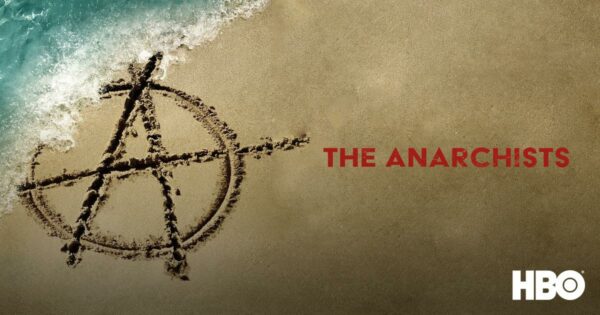“The only reason that, you know, we were in Acapulco and in Mexico to begin with was resisting the state.” Lily Forester’s admission comes somewhat unexpectedly during a later episode of the six-part series The Anarchists, Todd Schramke’s sprawling HBO documentary about a community in Acapulco, Mexico, where some United States expats relocated to explore their interest in anarchism.
While discussions between the anarchists in this docuseries certainly encircle the ethical conundrums of maintaining freedom without a central body of governance, they also reveal the complicated inconsistencies of self-identification. For six years, Schramke followed key figures surrounding Anarchapulco, a punnily named anarchist festival. In episode one, playboy and festival founder Jeff Berwick is being filmed by Schramke’s crew, and he’s also filming his own video diary for his followers. He acknowledges the presence of the camera crew and goes into his personal account of “discovering” Acapulco, describing his awe at the air of freedom in the coastal environment. Berwick, who emigrated from the U.S., got rich during the dot-com boom after founding a website called Stockhouse. The scenery is idyllic and coastal; boats, hotels, houses overlooking the bay, and resorts are a few of the locales of this story. The ensuing events of the series portray a rare idealism: an optimistic view of the future.
The problem with organizing anarchists is that they don’t believe in organization. Everything involving an anarchist is at-will — they’re allergic to contracts and they don’t trust authority. They also don’t ask for permission, because they don’t believe in permission. This makes Anarchapulco a conference with an inherent dynamic: without any founding document or structure to guide the event, people inevitably are cast into and out of organizational roles. The documentary historicizes accounts from a few (though certainly not all) parties that articulate this inevitability, and track the individuals’ stories to expectedly fraught conclusions.
One reality of the group’s longtime stateless ideology is wealth in cryptocurrency. Because digital currency is sometimes used to evade governments and banks, some of the conference attendees were early adopters of Bitcoin, meaning their wealth increased when its price surged in the 2010s. The Anarchists is not a film about cryptocurrency hype, because Schramke understood that poring over the minutiae of the emergent technology does not serve the human interest aspect of this documentary work (if you would like learn more about it, you may instead read this essay by Akshat Khare). Rather, the quick, extreme wealth gap that emerged between anarchists at the height of Bitcoin’s market served to only exacerbate tensions among the group.
The series’ main characters, whose stories are traced chronologically, illustrate differing motivations and approaches to anarchic lifestyles. There’s Lisa and Nathan Freeman, a married couple with kids that wanted to escape their banal existence in the suburbs of Atlanta. Nathan became a member of the organizational team for Anarchapulco after his family relocated to Mexico in 2016. There’s Juan Galt, a longtime cryptocurrency and anarchist personality who has blogged his experiences within this lifestyle since the early 2010’s. Jeff Berwick, the aforementioned founder of the annual festival, is seen acting as master of ceremonies for the events (at which Schramke’s filmed on-site), and in many solo interviews. And then there’s John Galton (born Shane Cress) and Lily Forester (born Miranda Webb).
John and Lily are two American millennials from Ohio. In the footage from their early days in Acapulco, they have massive, matted dreadlocks that hang down the backs and sides of their sleeveless shirts. They escaped the United States by car, despite being wanted for drug charges, and found refuge in Mexico. The pair are young, poor individuals who are not following the herd or chasing the American dream. Their presence proves Anarchapulco’s big promise: that there is a place to go to escape the state. Ultimately, John and Lily’s history is a singular example that illustrates the stakes that have led some of these conference goers to pursue an anarchist lifestyle. Their story alone is worth the watch.
The characters in The Anarchists are living out an experiment, and the more people that show up and join the community, the more harrowing the experiment becomes. Like in Wild Wild Country (Netflix, 2018), stakes are raised with each episode as the whims of individuals in the community are pitted against the group’s utopic mission. Since the anarchists see themselves as wronged by their respective governments, and take a moral stance against state-sanctioned authority, there’s an unavoidable question lingering over the group: what kind of authority will take the place of the state? Before this answer can come about, the characters’ interpersonal relationships clash. There are disagreements about running the conference, strained friendships and relationships, and eventually, violence.
As you’ll hear in the interviews from The Anarchists, anyone who is willing and cooperative with the state is a “statist.” This is declared as a fact, and also rendered as an insult to individuals within the group who aren’t holding up their dedication to remain self-governed. Much of this resentment comes from bad experiences with our given social contract and our legal system. Lily Forester says succinctly, “My entire life since conception has been affected by the war on drugs.” Her disbelief in the United States’ drug laws comes from experience: she has watched the state fail to deliver justice in ways that have real impacts on her freedom and autonomy. The Freeman family, comparatively, is dissatisfied with the United States’ school system, and wish to raise their children by their own metrics for success. Both of these concerns are relatable and valid, especially considering the U.S.’ ongoing problems around prison crowding, excessive sentencing, and the underfunding of public education.
However, the concept of anarchism is tricky. The idea that the entire structure of governance that has shaped our reality should be dissolved, leaving millions to sort out things like the maintenance of roads or administering a nationwide vaccine rollout during a pandemic, is pretty hard to imagine. On top of that, it’s near impossible to find a place that could host an anarchist utopia; the characters in this film didn’t find an undeveloped plot of land and create a city from scratch, but they instead moved to a resort town in Mexico, which has a significant drug cartel presence.
The seriousness of the cartel comes through in later episodes, but Mexico is not addressed as a subject of politics during this series. This may have been for brevity, or to contain the series in what it is trying to accomplish, which is to present a portrait of people who dreamt of an impossible kind of freedom. These characters, generally, come from a land that purports a whole lot of freedom: the United States. The subject of how “dangerous” Acapulco is comes to mind, and becomes a throughline in later episodes. Tourists are safe, so long as they stay out of the drug trade. This, however, isn’t the case for every anarchist who calls the city home. Acapulco can host the freethinking Anarchapulco attendees because the infrastructure is already in place, but because the site is a normal luxury resort, an underlying social contract is always in place.
The Anarchists is a snapshot of a group of people who have a goal and feel excited about its potential. As compared to fraud documentaries like Fyre Fest and Enron: The Smartest Guys in the Room, which cover the big personalities behind oversold products, The Anarchists presents a group of people who have pulled the wool over their own eyes. The critical mass of hopeful anarchists means that, against all odds, there are times where a sense of progress takes hold amongst this fringe group.
The characters in The Anarchists actively pursue the end to their questions about society, and their answers are delivered with somber reflection, but not defeat. It is hard to find discussions about the potential of society which have any real investment behind them. In this documentary, many epiphanies come about, and they aren’t all pleasant. If one thing could be said about the anarchists in the series, it’s that they believe in a collective solution to some of humanity’s oldest problems. For this reason alone, Schramke’s documentation of their experiment is a remarkable watch.
William Sarradet is the Assistant Editor for Glasstire.




